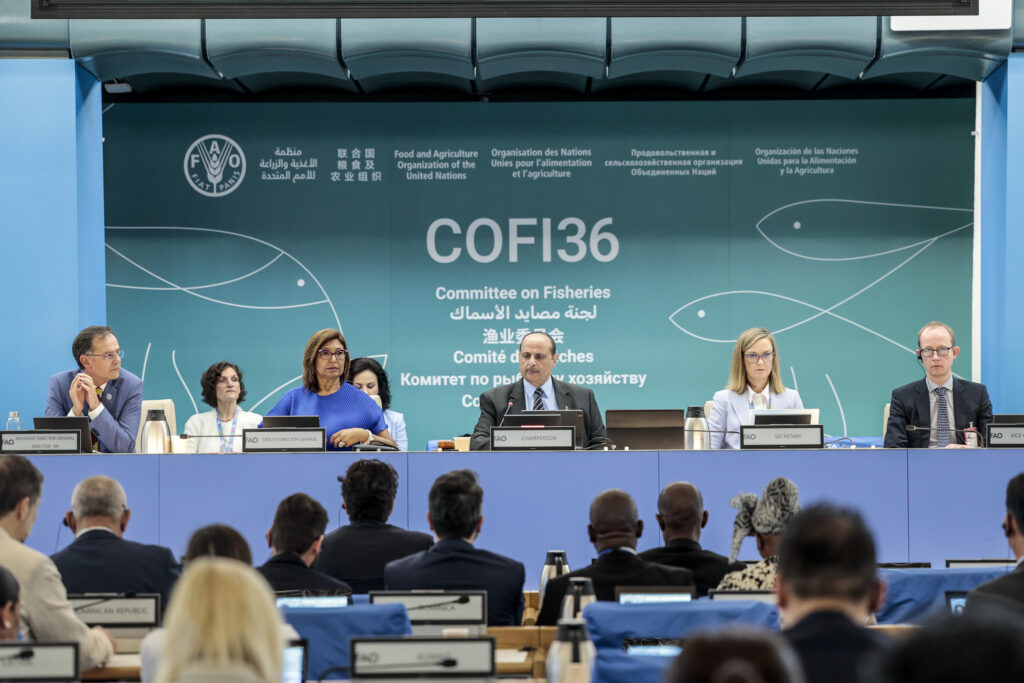ROME – The 36th meeting of the Committee on Fisheries (COFI36) began today at the Rome headquarters of the Food and Agriculture Organization of the United Nations (FAO).
The Committee on Fisheries (COFI) is the world’s largest gathering of policymakers, experts and partners in the fisheries and aquaculture sector. This week’s (8-12 July) COFI36 meeting will focus on the vital role of fisheries and aquaculture in tackling food insecurity, malnutrition and poverty, highlighting the capacity of fisheries and aquaculture to alleviate hunger, drive sustainable growth and reverse environmental degradation.
“The global aquaculture industry continues to expand, driving supplies of fish and seafood to new records. In 2022, aquaculture will surpass capture fisheries as the leading source of aquatic animals. Ensuring sustainable aquaculture expansion is of fundamental importance to consumers,” FAO Director-General Qu Dongyu said in a video message at the start of the session.
Last month, FAO released its latest State of World Fisheries and Aquaculture (SOFIA) report, showing that global fisheries and aquaculture production will reach a record high of 223.2 million tonnes in 2022. Qu also noted in his message that seafood must contribute more to fighting hunger and malnutrition among a growing population. But to do so, aquaculture must ensure it continues to grow sustainably, especially in food-deficit regions, and that success in setting up effective fisheries management systems can be extended to fisheries where sustainability is a challenge.
The FAO chief also said there was an urgent need to develop seafood value chains, including reducing losses and waste and making products more accessible to markets.
Addressing global challenges in seafood food systems
Topics to be discussed include the role of seafood in global food security and nutrition, its potential as a solution to climate change and the contribution of effective management to long-term biodiversity goals. Additionally, solutions and actions to address immediate challenges facing the seafood system, such as climate change and plastic pollution, will also be explored.
At the heart of the discussion will be efforts to strengthen data collection and stock assessment systems to inform fisheries management and encourage countries to enhance evidence-based policymaking. The session will also feature the presentation of first results from FishMIP 2.0, a global effort to project the impacts of climate change on marine ecosystems and fisheries under a range of future climate scenarios.
Biodiversity conservation will be a key theme, with delegates invited to discuss the impacts of the Kunming-Montreal Global Biodiversity Framework on fisheries and aquaculture, both in large marine ecosystems and in areas beyond national jurisdiction.
10 Years of the SSF Guidelines
Today also saw the holding of a high-level event to mark the 10th anniversary of the approval of the Voluntary Guidelines for Ensuring Sustainable Small-Scale Fisheries in the Context of Food Security and Poverty Eradication (SSF Guidelines), highlighting the important contribution of small-scale fishers and fish workers to food security, nutrition and livelihoods, particularly in low- and lower-middle-income countries. Small-scale fisheries account for at least 40 percent of the world’s fish catch and represent approximately 90 percent of the total number of fish workers in the world. The economic value of landings from small-scale fisheries is estimated at $77.2 billion.
“The SSF Guidelines are the first and only global normative document entirely focused on small-scale fisheries. They reflect the needs and aspirations of more than 500 million people around the world,” the FAO Director-General said in a video message to the event, referring to the number of people who depend on small-scale fishing for at least part of their livelihoods.
The event also featured speeches from representatives of the European Commission, Peru, the Philippines, the United Republic of Tanzania and the United States of America, as well as small-scale fisheries stakeholders.
COFI Subcommittee
At COFI36, the Sub-Committee on Aquaculture, Fisheries Management and Trade will present the main outcomes of its previous session.
The Guidelines for Sustainable Aquaculture will be considered for final approval, aiming to harness the potential of the aquaculture sector to sustainably meet the growing global demand for seafood. In addition, the tasks and steps required for the finalization of the FAO Guidelines on Social Responsibility in Fisheries and Aquaculture Value Chains will also be discussed.
COFI36 will host an interactive digital exhibit showcasing Blue Transformation in action. The exhibit will provide a journey towards sustainability and resilience through tools, devices, 3D models and an interactive virtual tour on the research vessel Dr. Fridtjof Nansen. Part of the exhibit, the Speakers’ Corner will serve as a platform for COFI attendees to share their insights, innovations and best practices on sustainable fishing and aquaculture.
Side events are back on the COFI agenda for the first time since the COVID-19 pandemic. COFI36 will feature events on a range of issues, including the implementation of sustainable aquaculture guidelines, developing resilient and productive aquaculture, success stories of women’s empowerment in small-scale fisheries and aquaculture, and youth voices in the fishing industry.
Fisheries Committee
The Committee on Fisheries (COFI), a subsidiary body of the FAO Council, was established by an FAO Conference in 1965. It is the only global intergovernmental forum where FAO Member States come together to consider issues related to fisheries and aquaculture.
COFI is unique in that it provides regular global recommendations and policy advice to governments, regional fishing organizations, civil society organizations, the private sector and international community actors. COFI plenary meetings are held every two years. Typically, plenary meetings discuss and address current issues related to fisheries and aquaculture, review progress and set priorities for future work.


